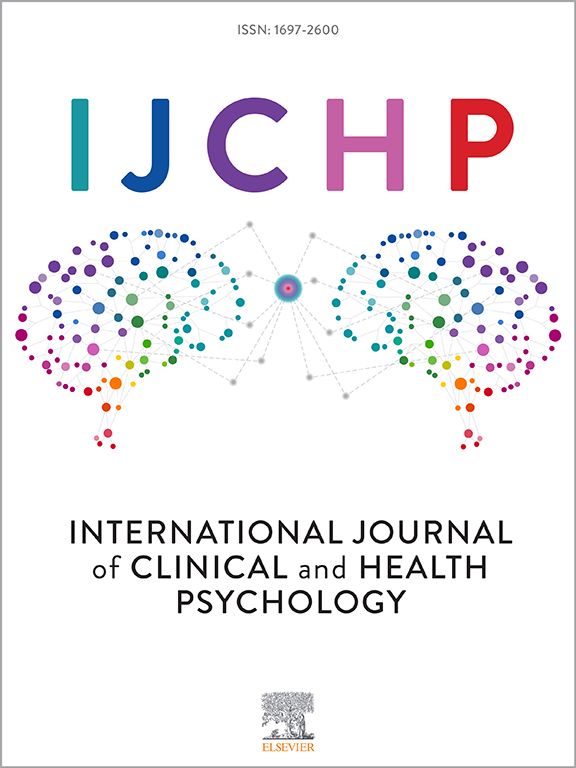It’s better to run towards the fire: The experience of reserve duty for reservists with PTSD prior to re-enlistment
IF 4.4
1区 心理学
Q1 PSYCHOLOGY, CLINICAL
International Journal of Clinical and Health Psychology
Pub Date : 2025-07-01
DOI:10.1016/j.ijchp.2025.100621
引用次数: 0
Abstract
Background
Little research exists delineating the experience of serving in the military with PTSD despite longitudinal studies indicating that a small percentage of deployed combat soldiers have PTSD prior to deployment. Following a mass re-enlistment of reserves, during the Iron Swords war, the current qualitative study aimed to describe the experience of fifteen reservists with pre-existing PTSD and explore the clinical difficulty or utility of their service.
Methods
Reservists were interviewed by trained clinicians and interviews were transcribed and analyzed using a grounded descriptive phenomenological approach.
Results
Findings demonstrated a key theme of a reparative experience in addition to the differentiation between functioning on the domestic and military front and the differentiation between the fantasy of success versus the reality of re-enlistment with PTSD. The experience of re-enlistment as a reservist compared to the original PTSD-inducing service was described in terms of enhanced capability, a greater awareness of emotional needs by seniors and the establishment in general, enhanced choice (including that to re-enlist) and the utility of PTSD symptoms such as hyperawareness, on the battlefield compared to the futility at home.
Conclusions
The study highlighted the unknown nature of repeated duty and the potential for increased difficulty of transition between military and domestic spheres while acknowledging the potential for a positive experience of re-enlistment with PTSD. The findings reinforced the need for clear clinical guidelines within the military and importance of monitoring for risk of deterioration of symptoms both on the battlefield and following discharge when enlisting those with PTSD.
最好是奔向火场:重新入伍前患有创伤后应激障碍的预备役军人的预备役经历
背景:尽管纵向研究表明一小部分部署的战斗士兵在部署前患有PTSD,但很少有研究描述患有PTSD的军队服役经历。在铁剑战争期间,大量预备役人员重新入伍,本定性研究旨在描述15名预先存在的创伤后应激障碍预备役人员的经历,并探讨他们服役的临床困难或效用。方法由训练有素的临床医生对预备役人员进行访谈,并使用基于描述现象学的方法对访谈进行转录和分析。结果研究结果显示了创伤后应激障碍患者在家庭和军事方面的区别,以及成功的幻想与重新入伍的现实之间的区别,以及修复体验的关键主题。与最初的创伤后应激障碍诱导服务相比,作为预备役人员重新入伍的经历被描述为能力增强,老年人和一般机构对情感需求的更大认识,增强的选择(包括重新入伍)以及创伤后应激障碍症状的效用,如在战场上的高度意识,与在家里的无用相比。结论:该研究强调了重复服役的未知性质,以及在军事和家庭领域之间过渡的难度增加的可能性,同时承认了PTSD患者重新入伍的积极体验的可能性。研究结果强调了在军队中制定明确的临床指导方针的必要性,以及在战场上和退伍后招募创伤后应激障碍患者时监测症状恶化风险的重要性。
本文章由计算机程序翻译,如有差异,请以英文原文为准。
求助全文
约1分钟内获得全文
求助全文
来源期刊

International Journal of Clinical and Health Psychology
PSYCHOLOGY, CLINICAL-
CiteScore
10.70
自引率
5.70%
发文量
38
审稿时长
33 days
期刊介绍:
The International Journal of Clinical and Health Psychology is dedicated to publishing manuscripts with a strong emphasis on both basic and applied research, encompassing experimental, clinical, and theoretical contributions that advance the fields of Clinical and Health Psychology. With a focus on four core domains—clinical psychology and psychotherapy, psychopathology, health psychology, and clinical neurosciences—the IJCHP seeks to provide a comprehensive platform for scholarly discourse and innovation. The journal accepts Original Articles (empirical studies) and Review Articles. Manuscripts submitted to IJCHP should be original and not previously published or under consideration elsewhere. All signing authors must unanimously agree on the submitted version of the manuscript. By submitting their work, authors agree to transfer their copyrights to the Journal for the duration of the editorial process.
 求助内容:
求助内容: 应助结果提醒方式:
应助结果提醒方式:


